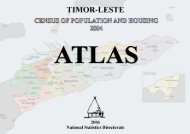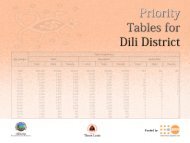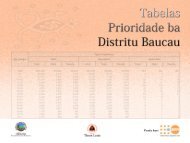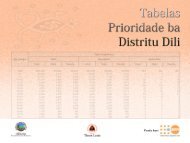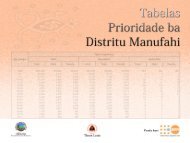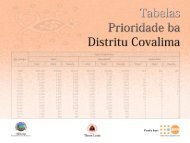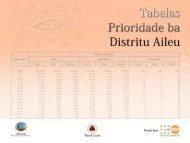Demographic and Health Survey 2009-10 - Timor-Leste Ministry of ...
Demographic and Health Survey 2009-10 - Timor-Leste Ministry of ...
Demographic and Health Survey 2009-10 - Timor-Leste Ministry of ...
You also want an ePaper? Increase the reach of your titles
YUMPU automatically turns print PDFs into web optimized ePapers that Google loves.
Table 15.8 Indicators <strong>of</strong> women’s empowerment<br />
Percentage <strong>of</strong> women age 15-49 who participate in all decisionmaking, percentage who disagree with all reasons<br />
for justifying wife beating, <strong>and</strong> percentage who agree with all reasons for refusing sexual intercourse with husb<strong>and</strong>,<br />
by value on each <strong>of</strong> the indicators <strong>of</strong> women's empowerment, <strong>Timor</strong>-<strong>Leste</strong> <strong>2009</strong>-<strong>10</strong><br />
Currently married<br />
women<br />
Percentage<br />
who disagree<br />
Percentage<br />
who agree with<br />
Percentage<br />
with all the all the reasons for<br />
who participate<br />
reasons refusing sexual<br />
in all decision-<br />
justifying intercourse with<br />
Empowerment indicator<br />
making wife beating husb<strong>and</strong><br />
1<br />
Number <strong>of</strong><br />
Number <strong>of</strong><br />
Number <strong>of</strong> decisions in which<br />
women participate<br />
women<br />
women<br />
1<br />
0 na 95 18.3 65.0 95<br />
1-2 na 765 8.2 53.6 765<br />
3-4<br />
Number <strong>of</strong> reasons for which wife<br />
beating is justified<br />
na 7,047 11.6 57.8 7,047<br />
2<br />
0 76.6 895 na 39.4 1,815<br />
1-2 70.2 1,867 na 41.1 2,984<br />
3-4 74.0 3,414 na 47.8 5,552<br />
5<br />
Number <strong>of</strong> reasons given for<br />
refusing to have sexual intercourse<br />
with husb<strong>and</strong><br />
76.5 1,730 na 73.5 2,785<br />
3<br />
0 72.2 876 30.6 na 2,566<br />
1-2 74.9 2,484 8.0 na 3,930<br />
3 73.7 4,546 <strong>10</strong>.8 na 6,640<br />
na = Not applicable<br />
1 Restricted to currently married women. See Table 15.5.1 for the list <strong>of</strong> decisions.<br />
2 See Table 15.6.1 for the list <strong>of</strong> reasons<br />
3 See Table 15.7.1 for the list <strong>of</strong> reasons<br />
Table 15.8 shows these three indicators <strong>of</strong> women’s empowerment <strong>and</strong> how they relate to<br />
each other. It shows the percentage <strong>of</strong> married women age 15-49 who participate in all<br />
decisionmaking, the percentage <strong>of</strong> women who disagree with all the specified reasons for justifying<br />
wife beating, <strong>and</strong> the percentage <strong>of</strong> women who agree with all the specified reasons for a wife<br />
refusing to have sexual intercourse with her husb<strong>and</strong>, by the value on each <strong>of</strong> the indicators. In<br />
general, the expectation is that women who participate in making household decisions are more likely<br />
to have gender-egalitarian beliefs.<br />
The findings on women’s empowerment indicate that among women who participate in all the<br />
decisions, 58 percent justified their right to refuse sexual intercourse with their husb<strong>and</strong> for all<br />
reasons, compared with women who participated in 1-2 decisions (54 percent) <strong>and</strong> in no decisions<br />
(65 percent). Similarly, women who participated in all decisions are more likely to disagree with all<br />
the reasons for justifying wife beating (12 percent) than women who participate in fewer decisions<br />
(8 percent). However, it is also important to point out that women who participate in no decisions are<br />
most likely to disagree with all the reasons for justifying wife beating (18 percent). This anomalous<br />
pattern is difficult to explain. Similarly, women who do not support wife beating for any reason at all<br />
are most likely to participate in all the decisionmaking in the household (77 percent), but this<br />
percentage is similar to women who justify all five reasons for wife beating. The direction <strong>of</strong> the<br />
relationship between participation in decisionmaking <strong>and</strong> reasons to justify wife beating is not clear.<br />
Similarly, there is no strong relationship between participation decisionmaking <strong>and</strong> the number <strong>of</strong><br />
reasons for refusing sexual intercourse with a husb<strong>and</strong>. This may be attributed to the fact that<br />
<strong>Timor</strong>ese women in general exhibit a culture <strong>of</strong> tolerance <strong>and</strong> acceptance <strong>of</strong> male domination, since<br />
the majority <strong>of</strong> women mentioned that it is acceptable for a man to beat his wife for at least one<br />
reason (86 percent as seen in Table 15.6.1).<br />
It is also noteworthy to point out that women who disagree with all the reasons justifying wife<br />
beating are also most likely to not accept any reason for a woman to refuse sexual intercourse with her<br />
husb<strong>and</strong> (31 percent), <strong>and</strong> this percentage decreases to 8 percent for women who accept at least one to<br />
two reasons <strong>and</strong> 11 percent for women who accept all three reasons.<br />
Women’s Empowerment <strong>and</strong> <strong>Demographic</strong> <strong>and</strong> <strong>Health</strong> Outcomes | 221




